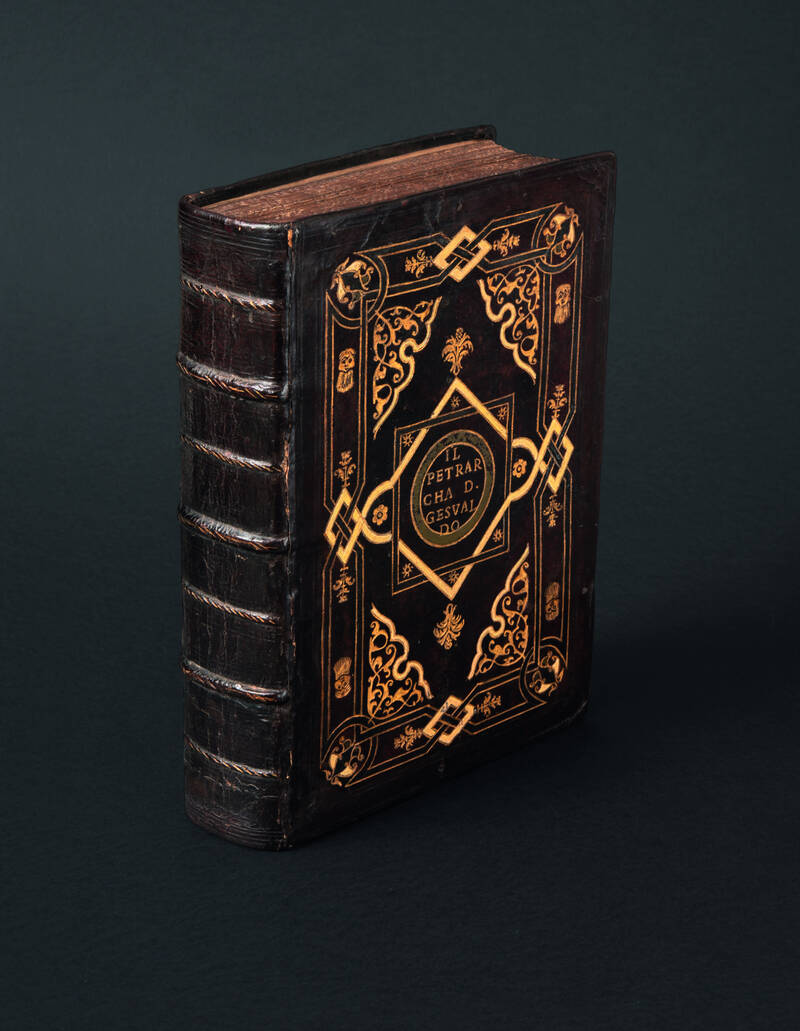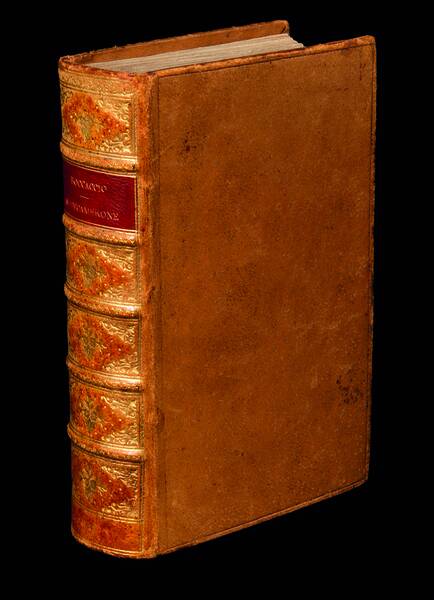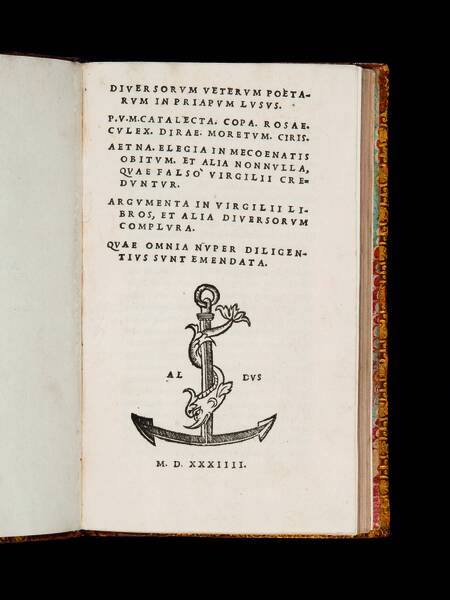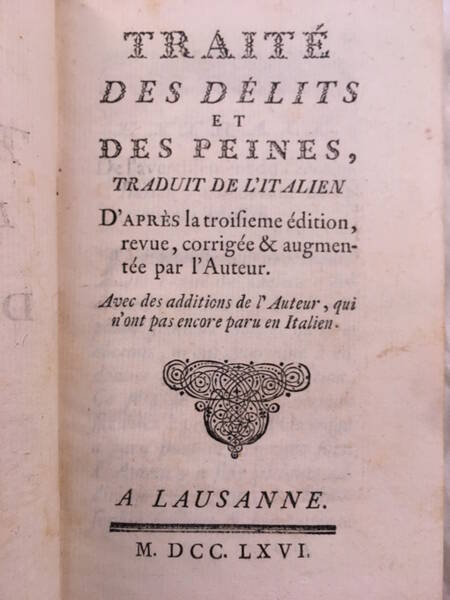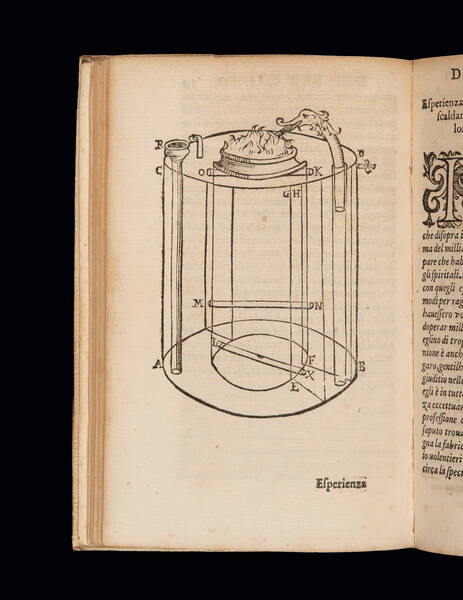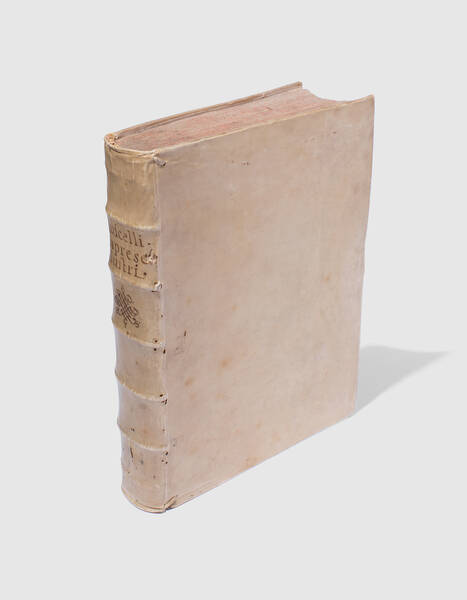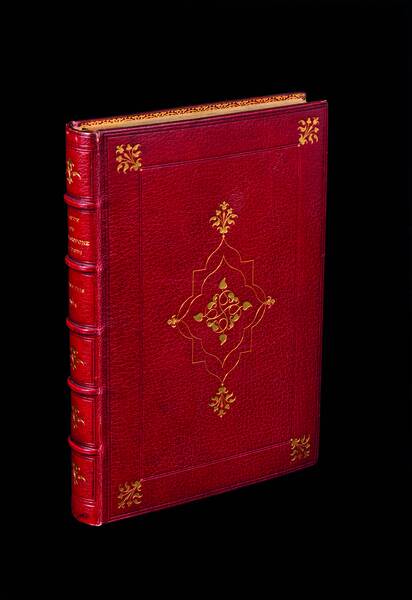PETRARCA, Francesco. Il Petrarcha colla spositione di misser Giouanni Andrea Gesualdo. I Triomphi del Petrarcha colla spositione di misser Giouanni Andrea Gesualdo da Traetto.
Venice, per Ioan. Antonio di Nicolini et i fratelli da Sabbio., 1541.Quarto (212 x 148 mm.), two parts in one volume; [24], 384, [4] leaves; [76] leaves. A few spots, some browning and finger marking, spine of binding restored but a good copy in a very rare contemporary binding. Sixteenth-century Venetian interlaced calf binding, in the center of the front cover a double gilt roundel containing “IL PETRARCHA D. GESUALDO”; on the rear cover a painted shield with an illegible coat of arms. Spine in compartments, edges gilt and gauffered.
An excellent exemplar of the second edition of Petrarca's poems accompanied by Giovanni Andrea, Gesualdo's (b. 1496) comprehensive and rich commentary, printed in Venice. The work comprises two parts with separate title pages: the first is dedicated to Maria de Cardona (1509-1563) and contains Gesualdo's biography of Petrarca and Laura, notes on the morality and quality of the Canzoniere, followed by extensive commentary that runs alongside each stanza; the second part is dedicated to Susanna Gonzaga (1485-1556) and focuses on the Trionfi with a side-by-side in-depth analysis. Francesco Petrarca (1304-1374) was an Italian poet, scholar, and early humanist whose works and ideas deeply shaped Humanism and the Renaissance. His lyrical works helped establish the sonnet as a significant poetic form and influenced countless poets. Notably, the Canzoniere included in first part of this volume is a collection of 366 poems dedicated to his unrequited and idealized love for Laura, a woman who purportedly was already married. Additionally, his Trionfi is an allegorical poem which explores the struggles of the human soul through themes of love, chastity, death, fame, time, and eternity, in a symbolic recreation of Ancient Roman Triumphs composed in terza rima. Petrarca's influence on literature was vast, particularly due to the use of vernacular Tuscan to write the two poems comprised in this edition, instead of the customary Latin.
Gesualdo's commentary of Petrarca was one of the most popular and complete of the sixteenth century, despite being often compared to the commentaries of Sebastiano Fausto (1502-1565) and Silvano da Venafro, published the same year as Gesualdo's first edition. His annotations have been associated with the ideas and teachings of Antonio Sebastiano Minturno (1500-1574), Gesualdo's mentor and relative by marriage, to whom a preliminary letter is addressed at the beginning of this work. “Gesualdo appears to be working through controversies about rhetoric and poetics aired at the Academy of Naples in his time. He examines the literal and figurative discourse of each poem and he records debates about rival interpretations. He presents divergent opinions, offers reasons for each, and nudges his readers to interpret matters according to their own convictions. Unlike other glossators who propound a single strong thesis, Gesualdo offers many. The result is the longest, richest, and most studiously detailed commentary on Petrarca's Rime e Trionfi in the sixteenth century.'' (Kennedy, p. 122)
Worldcat records only two copies in the UK (Edinburgh and Birmingham Universities).
USTC 762260; EDIT16 CNCE 32340; BM STC Italian p. 504; Hortis 63, p. 43; Fiske 1541, p. 98; Adams P807; Marsand p. 48; Kennedy, William. “Petrarchan Poetics.” The Cambridge History of Literary Criticism. 1999 (pp. 119 - 126).
Other Books
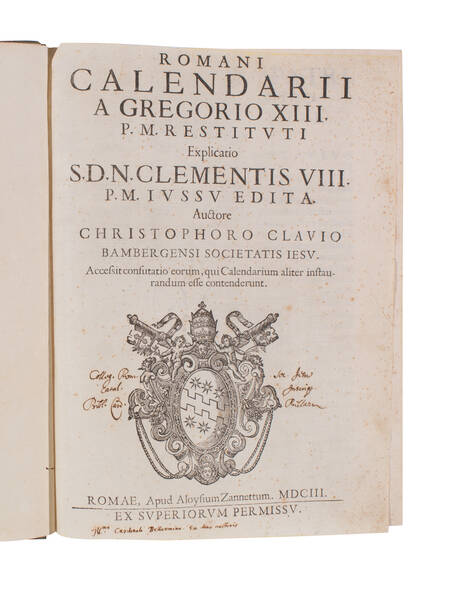
CLAVIUS, Christoph
Romani calendarii a Gregorio XIII. P.M. restituti Explicatio S.D.N. Clementis VIII. P.M. iussu edita.
SOLD OUT![[The Commentaries.] C. Julii Cæsaris Quae Extant. Accuratissimè cum Libris Editis & MSS optimis Collata, Recognita & Correcta. Accesserunt Annotationes Samuelis Clarke. S.T.P. Item Indices Locorum, Rerumque & Verborum Utilissimæ. Tabulis Æneis Ornata. [The Commentaries.] C. Julii Cæsaris Quae Extant. Accuratissimè cum Libris Editis & MSS optimis Collata, Recognita & Correcta. Accesserunt Annotationes Samuelis Clarke. S.T.P. Item Indices Locorum, Rerumque & Verborum Utilissimæ. Tabulis Æneis Ornata.](https://www.medariquier.com/typo3temp/pics/e0a4828aa4.jpeg)
CAESAR, Gaius Julius
[The Commentaries.] C. Julii Cæsaris Quae Extant. Accuratissimè cum Libris Editis & MSS optimis Collata, Recognita & Correcta. Accesserunt...
€ 20.000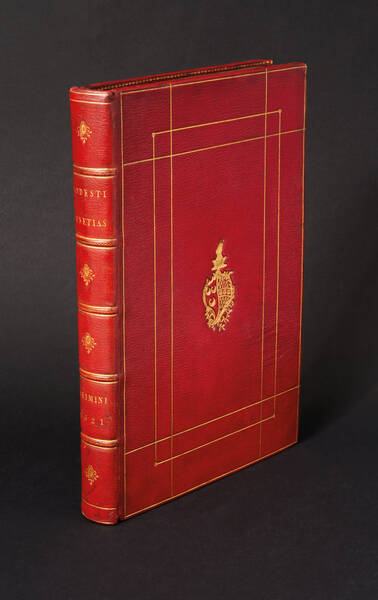
MODESTI, Publio Francesco
Pub. Francisci Modesti Ariminensis, ad Antonium Grimanum. P.S.Q.V. Venetias.
€ 23.000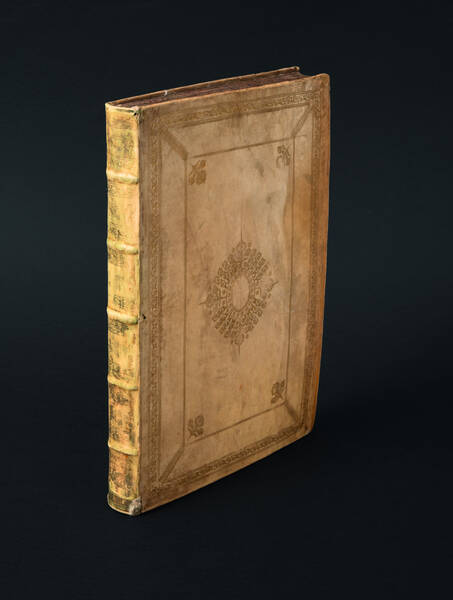
CONTILE, Luca
Ragionamento di Luca Contile sopra la proprietà delle imprese con le particolari de gli Academici Affidati et con le interpretationi et croniche.
€ 8.000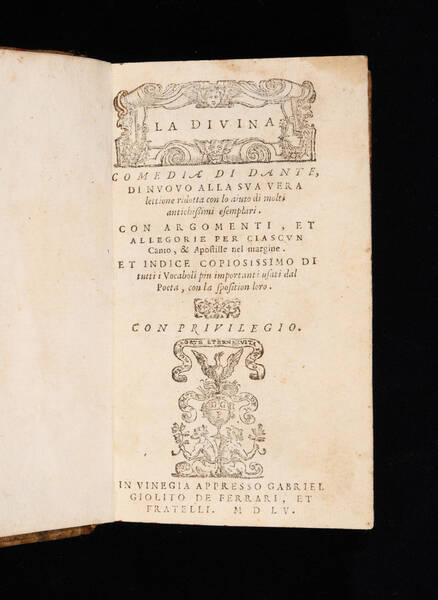
ALIGHIERI, DANTE
La Divina Comedia Di Dante, di nuouo alla sua vera lettione ridotta con loaiuto di molti antichissimi esemplari. Con argomenti, et allegorie per...
SOLD OUT![[De Architectura libri decem], M. Vitruuius per Iocundum solito castigatior factus cum figuris et tabula vt iam legi et intelligi possit. [De Architectura libri decem], M. Vitruuius per Iocundum solito castigatior factus cum figuris et tabula vt iam legi et intelligi possit.](https://www.medariquier.com/typo3temp/pics/b57e48f107.jpg)
VITRUVIUS POLLIO, Marcus
[De Architectura libri decem], M. Vitruuius per Iocundum solito castigatior factus cum figuris et tabula vt iam legi et intelligi possit.
SOLD OUT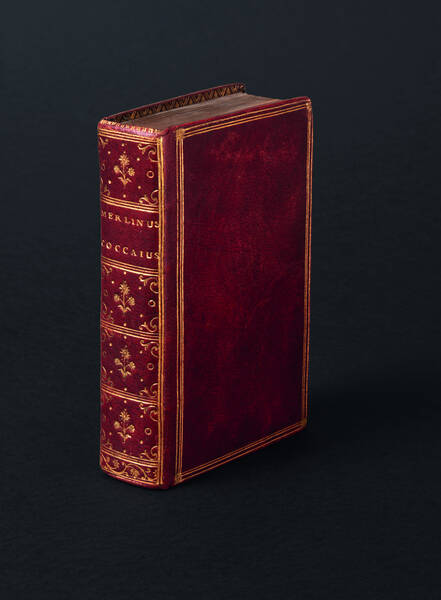
FOLENGO, Teofilo
Opus Merlini Cocaii poetae Mantuani Macaronicorum, totum in pristinam formam per me magistrum Acquarium Lodolam optime redactum in his infra notatis...
€ 11.000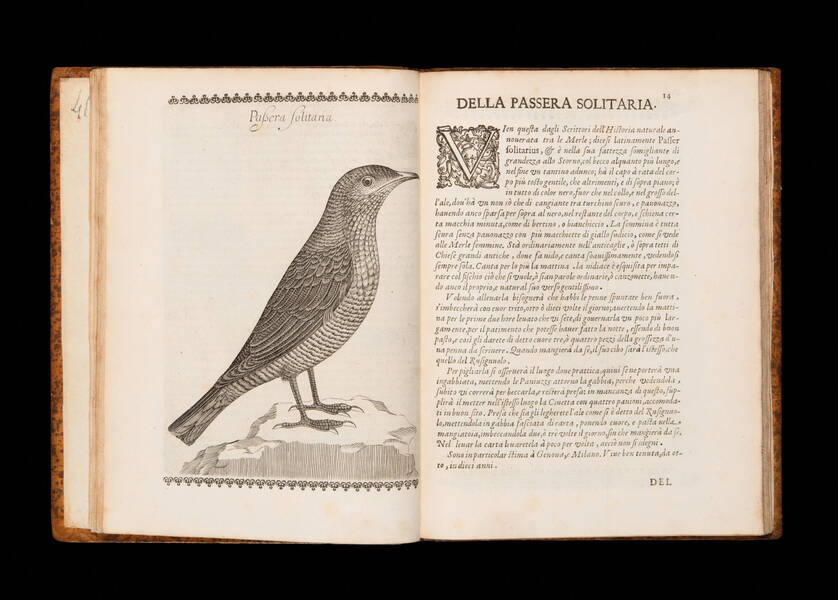
OLINA, Giovanni Pietro
Vccelliera ouero discorso della natura, e proprieta di diuersi vccelli, e in particolare di que' che cantano. Con il modo di prendergli, conoscergli,...
€ 6.000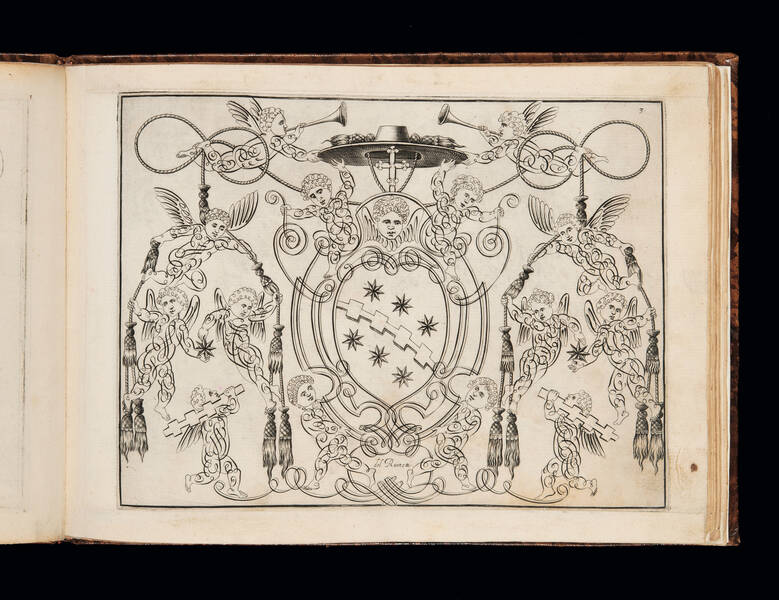
RUINETTI, Tomaso
Idea del buon scrittore, opera prima di Tomaso Ruinetti da Ravena a’beneficio de’desiderosi d’imitare le vere forme dello scrivere.
€ 8.000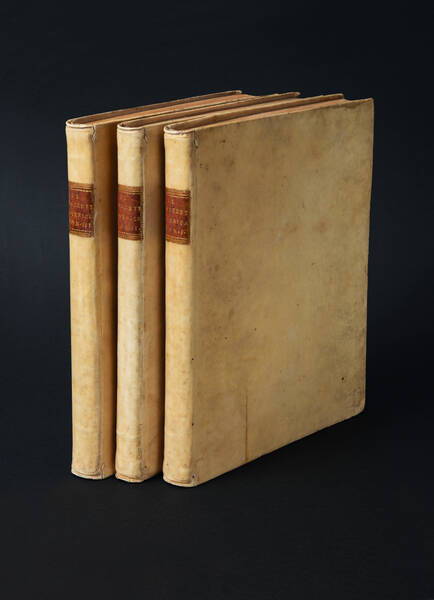
GAZZETTIERE AMERICANO
Il Gazzettiere Americano, contenente un distinto Ragguaglio di Tutte le Parti del Nuovo Mondo.
SOLD OUTMEDA RIQUIER rare books ltd.
4 Bury Street St James's
SW1Y 6AB London
Phone +44 (0) 7770457377
info@medariquier.com
